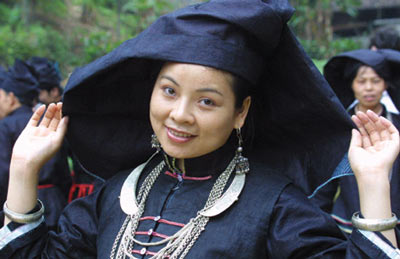
The Ancient Zhuang
Despite favorable natural conditions, the Zhuangs live in one of China's more backwater regions. Several areas still retain archaic ways of farming like slash and burn cultivation, and practice primitive hunting techniques. Ten years ago, Guangxi's Zhuang accounted for almost one-tenth of the total poor people in the country. To raise the community's standard of living, the local government encouraged a series of development programs in Guangxi, with the help of various non-governmental organizations. Within a decade, farmers' income had increased ten times. "In 2002 ... the average annual net income of farmers per capita exceeded 2,000 yuan (US$242)," revealed Li Zhaozhuo, Chairperson of Guangxi Autonomous Region.
Though their means are modest, the Zhuang have a rich cultural background. Highly musical, they have an impressive repertoire of folk songs, songs of worship and songs depicting the history of their people. Opera singing is a popular form of entertainment. The Zhuang's favorite opera is Zhuangju Opera, named after their ethnic group. Zhuang people love this opera that originated during the Tang dynasty (618 - 907) for its rich subject matter and unique way of expression, which is a combination of dialogue, metaphors, riddles, acting, song and dance. Throughout the year, the Zhuang hold regular songfests, which have launched many romances. Youths of marriageable age dress in their best and gather to socialize and choose prospective partners through these song competitions.
Accompanying their song-and-dance routines are percussion tunes from large bronze drums - a uniquely Zhuang folk instrument inherited from ancient times. To date, over 500 bronze drums of varied designs have been unearthed in Guangxi. The largest measures one meter across; the heaviest weighs over half a ton, and the lightest, a few kilograms. Their use, whether for military purpose, for entertainment, in religious ceremonies, or to symbolize status and wealth, has yet to be fully established.
Although they celebrate mostly the same festivals as the Han Chinese, the Zhuang do have their own festivals. The Cattle Soul Festival is celebrated after the ploughing in spring is complete. Every rice farmer offers glutinous rice and fresh grass to his cattle. The farmers believe the harsh whipping during ploughing season has frightened the cattle's souls away. The food ritual is a way of enticing the spirits back to their beasts of burden. On July 14 of the lunar calendar (which falls in August on the Gregorian calendar), Zhuang celebrate the Devil Festival - an important occasion second only to the Spring Festival. It is a festival for the souls of the dead. On that day, even the poorest families try to prepare a meat dish, as well as rice, as offerings to the spirits of their ancestors as a mark of respect, and to the souls of the dead in general.
|

![]() 北京市通信公司提供网络带宽
北京市通信公司提供网络带宽